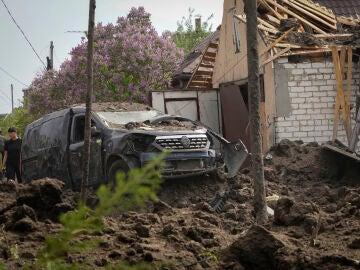
the governor of Belgorod, Viacheslav Gladkovhas accused the Armed Forces of Ukraine on Monday of having launched over the weekend various attacks on this border region, although he has stressed that no casualties or injuries have been reported.
Gladkov has reported that this Monday morning Graivoron, Kozinka, Gora-Podil and Zamosc have been under fire from the Ukrainian Armed Forces, and although air defense systems have managed to repel the attacks, it has later confirmed three injuries.
“The village of Kozinka is also under mortar fire. A shell hit a residential building and caused it to catch fire. Another projectile flew towards another house, as a result there was significant destruction of the supporting structures and a car was damaged,” he recounted in his Telegram account.
In Gora-Podil, a hay warehouse It has been engulfed in flames, while in Grayvoron, the projectiles have hit a transport company, although without causing physical damage.
For its part, the opposition group to the government of President Vladimir Putin known as Legion National Movement ‘Freedom of Russia’has claimed responsibility for these latest attacks.
“Inhabitants of the border regions! Stay at home, do not resist and do not be afraid: we are not your enemies. Unlike Putin’s zombies, we do not touch civilians and do not use them for our own purposes. Freedom is near!”, they have written on their Telegram profile.
A coup d’état for losing Bakhmut?
However, Gladkov himself has reported that a “sabotage and reconnaissance group” of the Armed Forces of Ukraine has entered the territory of the Grayvoron district, with which the Russian Army has “taken the necessary measures to eliminate the enemy.”
According to the governor of Belgorod, the Russian operation is made up of both border service agents, as well as members of the National Guard and the Federal Security Service, information that has also been shared by the Kremlin spokesman, Dimitri Peskov.
Peskov has assured that Russia has “sufficient forces and means” in the Belgorod region to overcome this offensive, and has warned that it is a diversionary maneuver by Ukraine to “minimize the political effect of losing Bakhmut“.
Later, Gladkov has confirmed that the Russian authorities have activated the anti-terrorist operation in the region “to guarantee the safety of the citizens of Belgorod”. This security regime establishes “special measures and temporary restrictions“.
The governor has indicated that these measures range from the verification of identity documents to the suspension of industrial activity in those “most dangerous” sectors, especially those linked to explosive, chemical or radioactive substances.
Ukraine denies its involvement in the operation
However, from Ukraine have denied any involvement in this operationwhich, they have stressed, has been carried out by these opposition groups, made up exclusively of Russian citizens.
“Ukraine is watching the events in the Russian Belgorod region with interest and studying the situation, but it has nothing to do with that“, said Adviser to the President of Ukraine Mikhailo Podoliak.
Thus, in a publication on his official profile on the social network Twitter, Podoliak stressed that the tanks are sold in Russian territory “in any military store” and that “underground guerrilla groups are made up of Russian citizens“.
On the other hand, the spokesman for the Intelligence services of the Ministry of Defense of Ukraine, Andri Yusov, has assured that the event is carried out by “the Russian Volunteer Corps and the Russian Freedom Legion”, which is looking for “liberate these territories of the Belgorod region of the so-called Putin regime”.
In this sense, Yusov has explained that this operation was not only intended “push back the enemy“, but also “to create a certain security zone to protect the Ukrainian civilian population.”
The region of Belgorod It has been the target of attacks from the Ukrainian side on several occasions, as denounced by the Russian authorities, which have decreed a high level of terrorist threat and a state of emergency in fifteen border towns.
Source: Lasexta
Ricardo is a renowned author and journalist, known for his exceptional writing on top-news stories. He currently works as a writer at the 247 News Agency, where he is known for his ability to deliver breaking news and insightful analysis on the most pressing issues of the day.











